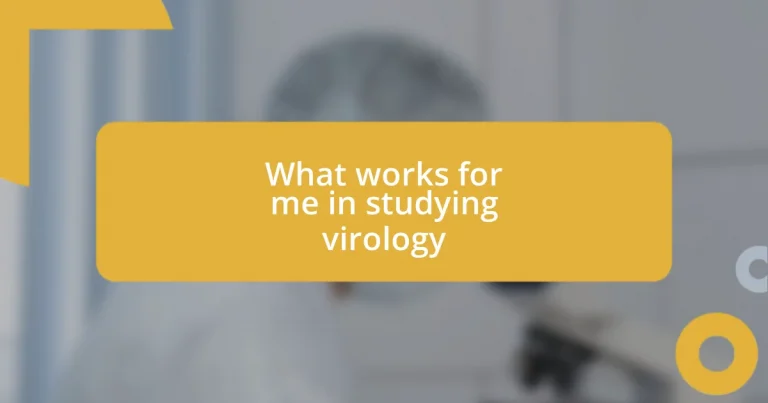Key takeaways:
- Understanding the fundamental structure and life cycles of viruses is essential for appreciating their impact on public health and the significance of vaccinations.
- Developing effective study habits, such as active learning techniques and maintaining an organized study environment, enhances retention and enjoyment in learning virology.
- Engaging in practical labs and collaborating with study groups fosters a deeper understanding of virology concepts through hands-on experience and shared insights.
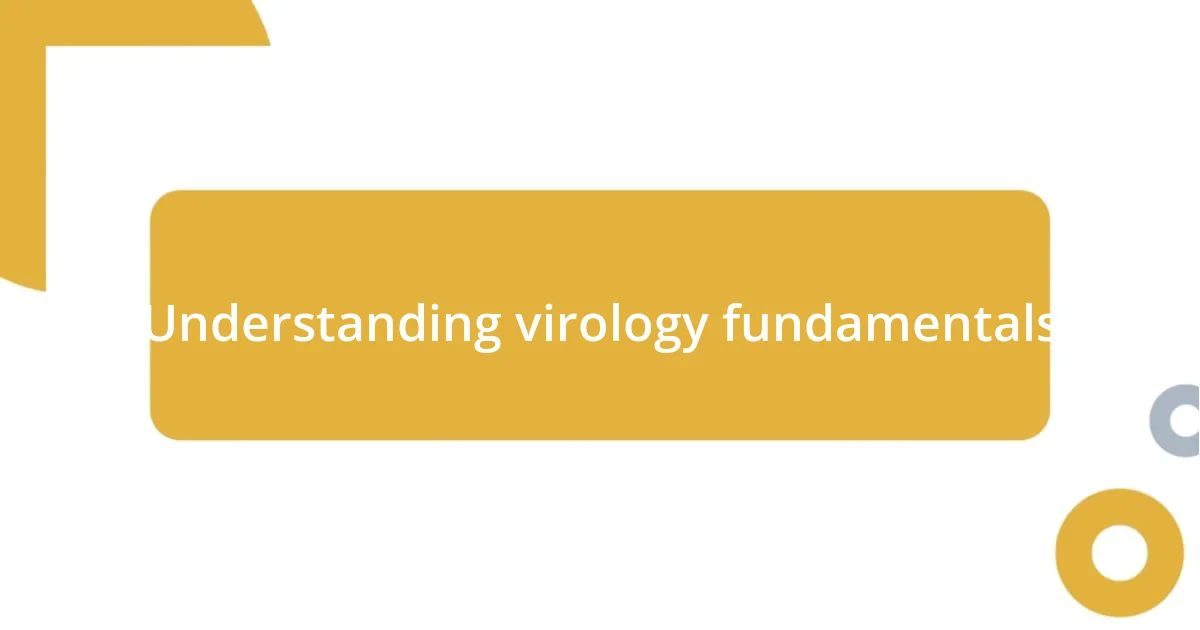
Understanding virology fundamentals
To really grasp virology fundamentals, I’ve found it essential to start with the basic structure of viruses: understanding what makes them tick. For instance, did you know that viruses are essentially just genetic material—either DNA or RNA—surrounded by a protein coat? This simplicity can be quite stunning; it often leaves me pondering how something so basic can have such complex behaviors and impacts.
As I delved deeper into virology, I realized the importance of studying viral life cycles. Watching how viruses invade host cells and replicate was nothing short of fascinating for me. I can’t help but wonder, how do these tiny entities manage to adapt so quickly? This adaptability is not just a scientific marvel; it frequently impacts public health, shaping outbreaks, and responses.
Connecting the dots between viral biology and real-world implications hit home for me when I learned about vaccines. The idea that we can train our immune systems to recognize and fight off viruses is empowering. It’s amazing to see how understanding these fundamentals can bridge the gap between science and everyday life, making the study of virology both relevant and vital.
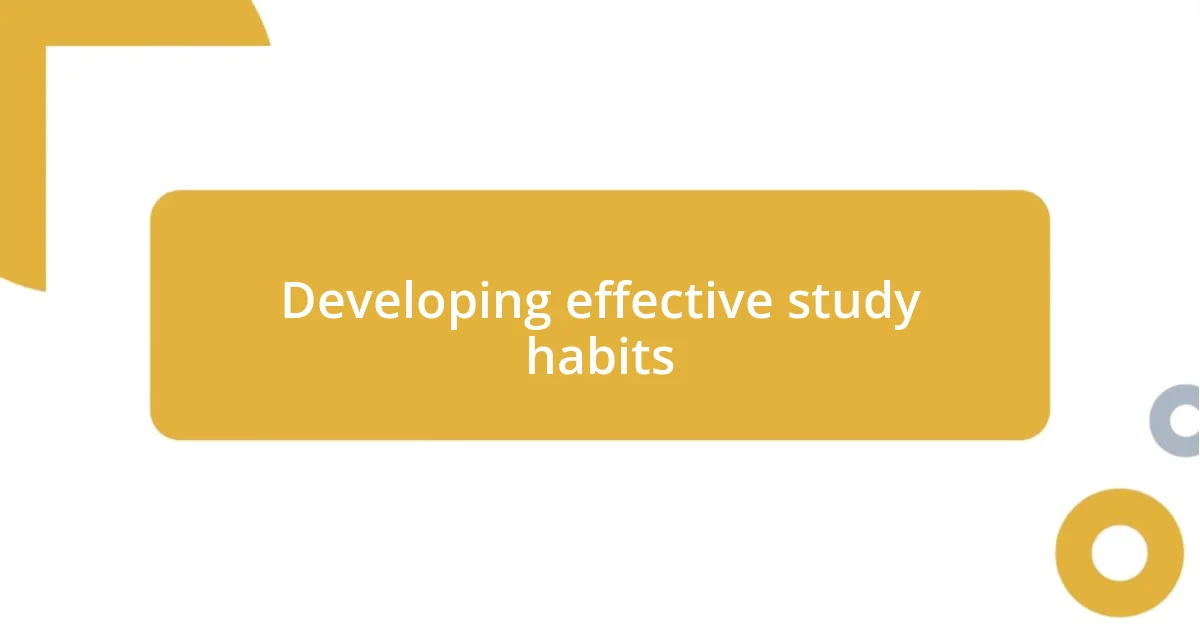
Developing effective study habits
Developing effective study habits is crucial in understanding the nuances of virology. I remember when I first tackled the sheer volume of information in this field—it felt overwhelming at times. To make it manageable, I discovered that breaking my study sessions into shorter, focused intervals led to better retention. I found that setting specific goals for each session kept me motivated, helping me to see progress without feeling burnt out.
Here are some strategies that worked for me:
- Create a Study Schedule: Allocating specific times for studying can establish a routine, making it easier to stick to your commitment.
- Use Active Learning Techniques: Engaging with the material through quizzes, flashcards, or teaching concepts to others reinforces what you’ve learned.
- Take Breaks: I learned that stepping away after intense study periods helps rejuvenate my mind, making me more productive in the long run.
- Stay Organized: Keeping notes, diagrams, and resources orderly allowed me to quickly reference materials when I needed a refresher.
- Find Your Optimal Study Environment: Whether it’s a quiet corner of a library or your favorite café, I found that my surroundings can significantly impact my focus and motivation.
These habits shaped my approach to studying virology, transforming it into a more enjoyable and effective experience.
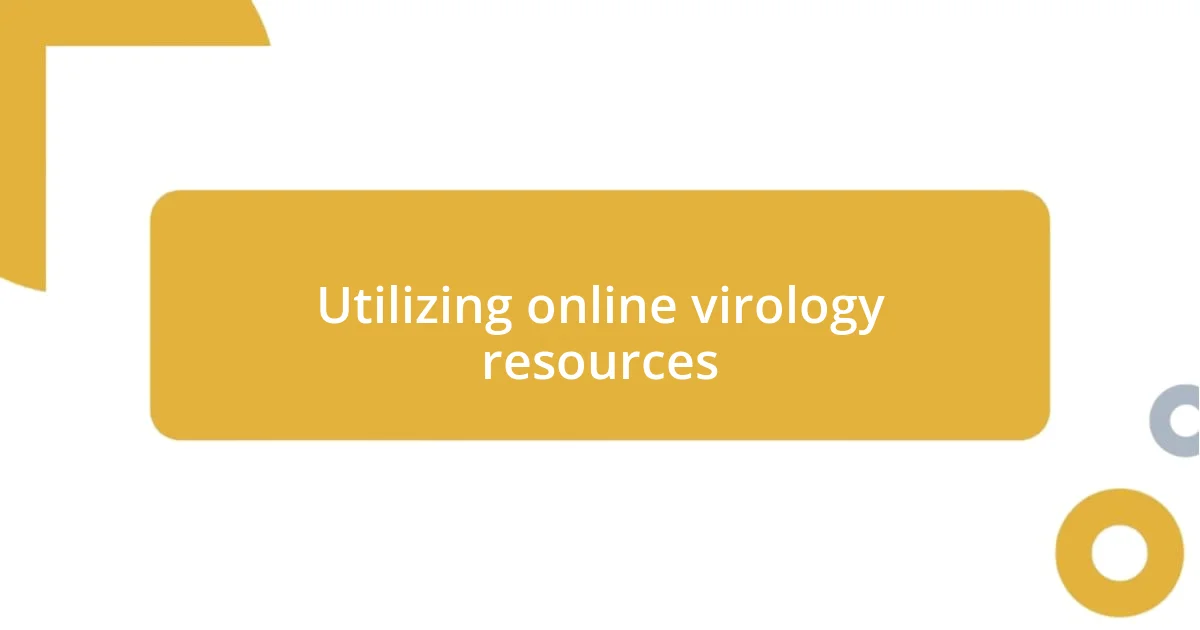
Utilizing online virology resources
Utilizing online virology resources has truly changed my approach to studying this complex field. I remember the days when I relied heavily on textbooks, feeling confined by the limitations of printed material. Discovering online platforms like Coursera and EdX opened up a world of interactive courses that made learning more dynamic. The ability to watch lectures from leading virologists, combined with discussion forums, allowed me to digest information at my own pace while also engaging with fellow learners worldwide.
One particular resource that has been invaluable is Virology 101 on YouTube. The engaging animations and clear explanations helped demystify challenging topics like viral replication and pathogenesis. Often, I would pause the videos, jotting down notes and reflections. Watching the intricate mechanisms of how viruses evolve and impact ecosystems made me appreciate the subject on a whole new level. Have you ever felt that spark of curiosity when something clicks? That’s exactly how I felt, and it fueled my passion for deeper exploration.
To sum up, utilizing diverse online resources not only diversifies my study techniques but also enriches my learning experience. Whether it’s participating in live webinars, engaging in interactive quizzes, or exploring specialized websites like the CDC’s virology page, I’ve noticed a significant improvement in my understanding. Each resource brings a unique perspective, and mixing them helps me stay enthusiastic about studying virology.
| Online Resource | Description |
|---|---|
| Coursera | Offers interactive courses from universities with a variety of modules. |
| YouTube – Virology 101 | Engaging videos explaining complex virology topics with animations. |
| CDC Virology Page | Provides current research, data, and information directly from health experts. |
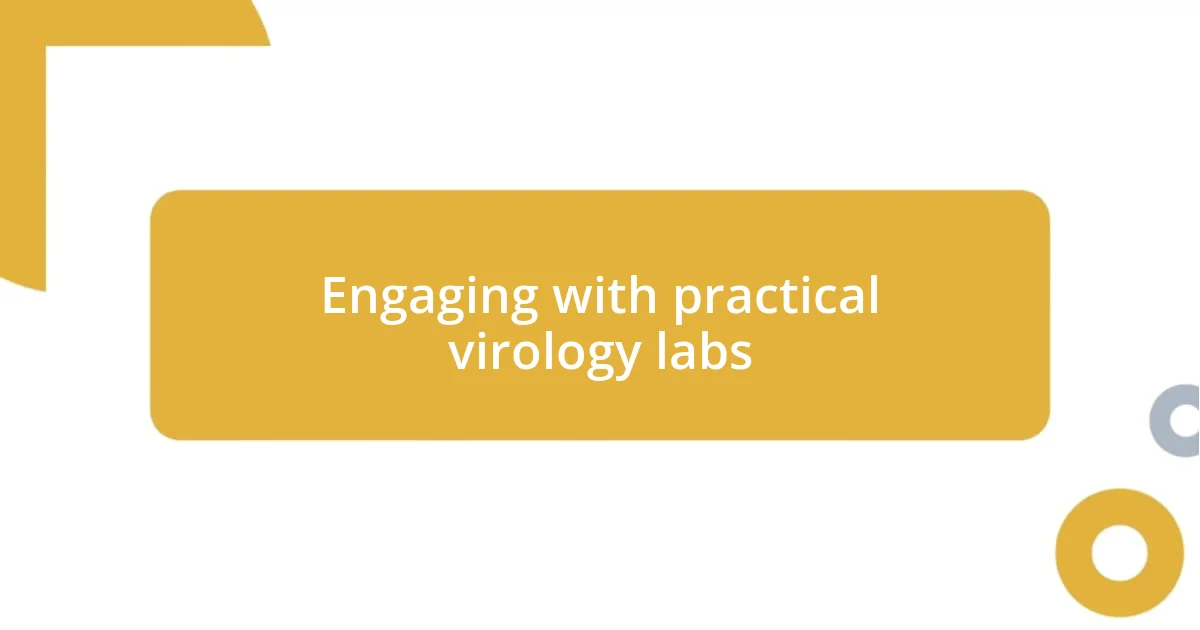
Engaging with practical virology labs
Engaging with practical virology labs has been a game-changer for me. I vividly recall my first hands-on session where we isolated viral RNA—it was exhilarating to see theories come to life in front of my eyes. Nothing beats the thrill of manipulating a pipette while following protocols; it’s where my textbook learning truly connected with real-world applications.
I often found myself reflecting on how critical these lab experiences are for mastering virology concepts. Have you ever delved into something and suddenly felt everything click? That’s exactly what happened to me during an experiment on viral cultures. By observing the growth and behavior of different strains, I gained insights that no textbook could provide. Each lab visit nurtured not just my understanding but my passion for the field, transforming complex topics into tangible experiences.
Moreover, the collaborative atmosphere in the lab kept me motivated. Working alongside fellow students, we shared discoveries and tackled challenges together. It fostered a sense of community that made even the most frustrating experiments enjoyable. I believe engaging in practical labs instills confidence and enhances critical thinking—qualities that are essential in virology. There’s something profoundly rewarding about asking a question, experimenting, and eventually finding the answer as a team. How could you not find that captivating?
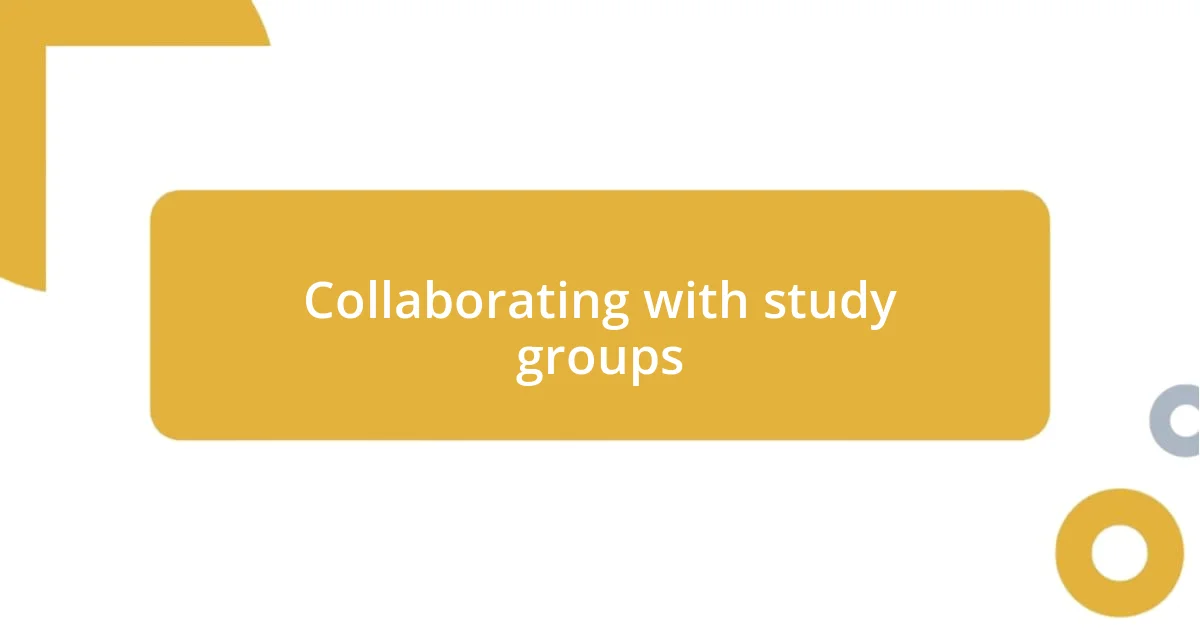
Collaborating with study groups
Collaborating with study groups has been instrumental in my journey through virology. It’s fascinating how sharing ideas with peers can illuminate difficult concepts. I remember one particular evening when my study group met to discuss viral genetics. As we talked about the implications of mutations, I felt an electric energy in the room. Each person contributed their thoughts, and suddenly, topics that seemed daunting began to feel manageable.
Working in a group setting also introduced me to varied perspectives that deepened my understanding. I once struggled with the intricacies of the immune response to viruses, but during a session led by a particularly knowledgeable classmate, everything clicked. Their passion was infectious, and as they broke down the material, I found myself not just learning, but truly engaging with the content in a way I hadn’t before. Have you ever had someone explain something that suddenly made it all make sense? That’s the magic of collaborative learning.
Additionally, the support system built within study groups helped me alleviate study stress. In those moments of self-doubt, just knowing that my fellow students were going through the same struggles provided immense comfort. I recall a particularly grueling week of exams; we organized a study marathon. Sharing snacks, quizzing each other, and laughing off the tension made a world of difference. It transformed studying from a solitary chore into an enjoyable experience filled with camaraderie—showing me that teamwork truly does enhance our grasp of complex subjects like virology.
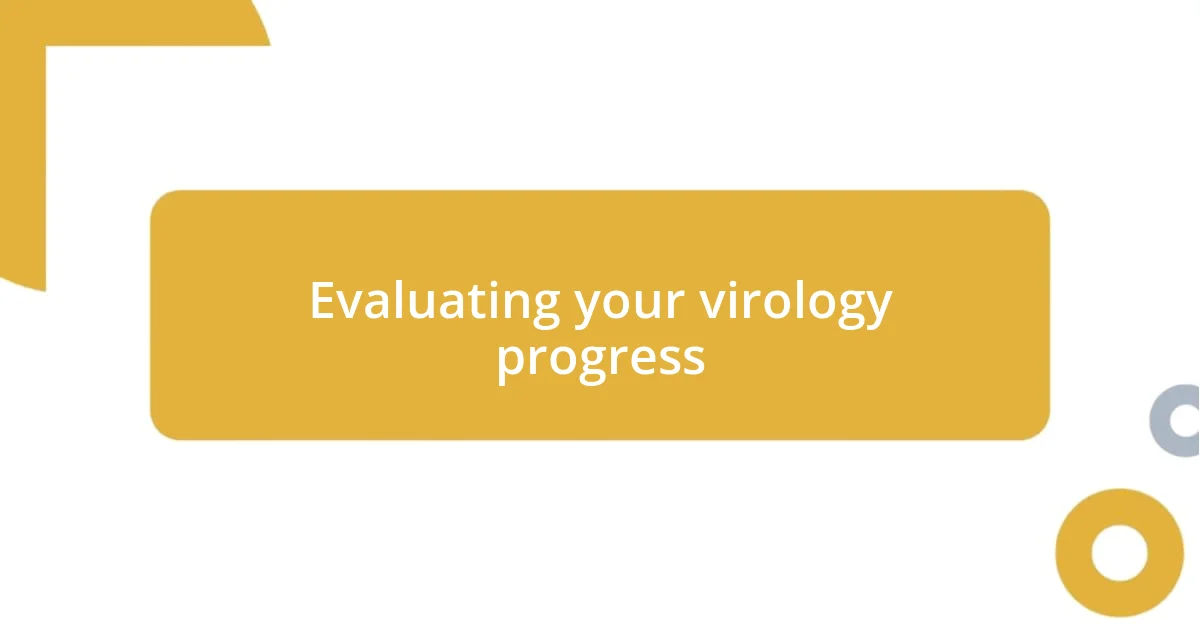
Evaluating your virology progress
Evaluating your virology progress is something I take quite seriously, as it helps me identify areas where I need to focus more attention. I vividly remember the first time I sat down with my notes and a stack of old exams. I was shocked to see patterns in my mistakes! This experience taught me to be proactive—if I wasn’t grasping certain concepts, I could tackle them head-on instead of letting them linger and gather dust.
One strategy I employed was creating a self-assessment checklist. For instance, after studying viral replication, I asked myself specific questions like, Can I explain each stage in detail? or Do I understand how each enzyme works? Gaining clarity on these points not only boosted my confidence but also helped track my progress. Have you ever experienced that moment of realization when everything just clicks? This method turned those abstract concepts into clear stepping stones toward mastery.
As I reflect on my progress, I’ve also found it beneficial to engage in discussions with instructors about my evolution. Seeking constructive feedback after presentations or lab sessions has opened my eyes to areas I might overlook. Have you considered how valuable that kind of insight can be? I remember a professor once pointed out my tendency to simplify complex ideas; while that’s a strength, I was encouraged to delve deeper. This encouragement has genuinely refined my understanding and helped me appreciate the nuances in virology I had previously overlooked.












